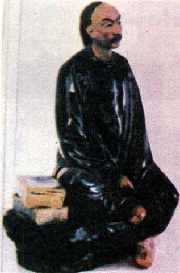Cao Xueqin (1715-1763) was a great writer in the Qing Dynasty (1644-1911). His personal name was Zhan, and his style name Mengruan. His representative workA Dream of Red Mansionswas written in the latter half of the 18th century, which is not only a great Chinese novel but also a gem of world literature. The work is named as one of the Great Four Works, together withThe Romance of the Three Kingdoms, Pilgrim to the WestandOutlaws of the Marsh.
 |
|
Cao Xueqin was the posthumous grandson of Cao Yin, who was the Textile Commissioner in Nanking and was greatly favored by Emperor Kangxi. The Cao family's power and wealth were at its height under Cao Yin. However, a few years after Cao Xueqin was born, the Cao family had reached its downfall due to political reasons. In 1742, Cao Xueqin was found living in poverty in the western suburb of Peking. He died in 1763, at around forty years old, leaving behind a wife. This novel was written when Cao Xueqin was living in poverty and it was meant to be a recount of Cao's childhood, yet the debate of whether Jia Bao-yu, the hero in the novel was meant to represent Cao remained.
The life of luxury in his boyhood acquainted him with the ways of noble families and the ruling class, while poverty in his old age enabled him to observe life more clearly and penetratingly. Based on his own understanding of life and with his progressive ideas, serious attitude and high craftsmanship, he was able to createA Dream of Red Mansions, a book regarded as the pinnacle of the Chinese classical novel. Of its 120 chapters, the first 80 were written by Cao Xueqin, while the last 40 chapters were thought to have been written by another writer, Gao E. Though certain differences with the former 80 chapters can be discerned in Gao E's sequel, in respect to ideological content and artistic achievement, it still basically follows Cao's original plan and makes the novel an integral whole.
A Deram of Red Mansions describes the life and declining fortunes of a large feudal family. At the heart of the novel is a tragic love story between Jia Baoyu, Lin Daiyu and Xue Baochai. The author, instead of telling the love story superficially, tries to tap the social origins of the tragedy through probing deeply into the characters' minds and the complicated relationships among them, hence exposing the hypocrisy and cruelty of feudalism and the decadence of the ruling class. The novel goes far beyond the tragic love story, to depict a broad swath of society through describing a series of complicated conflicts and struggles, and ultimately predicting the doomed fate of feudal society as a whole. The novel criticizes feudalism, its corrupt politics, marriage system and ethical relationships and passionately denounces its cruelty and inhumanity In China,A Dream of Red Mansionsis praised as an encyclopedia for analyzing feudal society.
A Dream of Red Mansions portrays a galaxy of unforgettable characters, including Jia Baoyu, Lin Daiyu, Xue Baochai, Wang Xifeng, Yuanyang, Qingwen, Lady Dowager, Jia Zheng, Jia She, Jia Zhen and Jia Lian. Jia Baoyu is a rebel of the feudal noble class. He lives in a large feudal family, but he resents their decadence and hypocrisy, and finally abandons them. His rebellious character is fully expressed in his attitude of indifference to the ways of aristocratic life. He holds in contempt the tiresome men and greatly sympathizes with the women, oppressed and trampled by the feudal system. Jia Baoyu's anti-feudal awareness is also reflected in his persistent pursuit of true love. The tragic love story between Jia Baoyu and Lin Daiyu is in fact a social tragedy.
